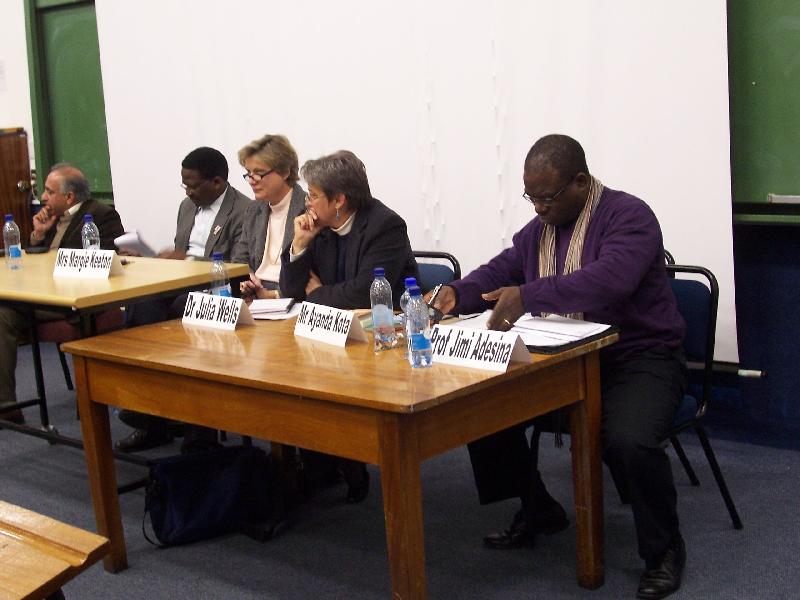
Rhodes University held a panel discussion on the Superior Courts Bill of 2010 on Monday (23 August) evening, which was chaired by the Vice-Chancellor, Dr Saleem Badat.
The panel welcomed the Bill which was introduced by Government in May 2010 for public discussion and comment before being taken before Parliament for debate and decision. Speakers particularly supported the Bill’s intention to rid South Africa of apartheid-era jurisdictional boundaries.
The Superior Courts Bill proposes, among other things, that:
? There should be one High Court of South Africa which consists of the General and Special Divisions;
? Each province should have one General Division of the High Court, except Gauteng which should have two General Divisions.
? Each General Division may have one or more local seats (of the General Division).
? Bhisho should be the seat of the Eastern Cape General Division.
? The High Court in Grahamstown should be the local seat of the Eastern Cape General Division.
Most members of the panel agreed that while this does not suggest a closure of the Court in Grahamstown, as was incorrectly stated in Rhodes University's original submission, it is still a significant downgrading of the High Court in Grahamstown.
Dr Sizwe Mabizela, Chairperson of the Grahamstown High Court Action Committee, outlined a brief history of the Court in the Eastern Cape. Grahamstown was the sole seat until the Transkei was granted “independence” in 1976, and a High Court established in Mthatha. In 1981, with the creation of the Ciskei, a further High Court was created in Bhisho.
Dr Mabizela stated that the view of the Grahamstown High Court Action Committee was that the loss to Bhisho of the seat of the Eastern Cape General Division would result in job losses and a ripple effect causing Makana Municipality to become severely constrained in its ability to provide services. The Hoexter Commission considered this in 1995, stating that moving the High Court would be crippling, if not catastrophic to the economy of Grahamstown.
At a meeting held under the Chairmanship of Justice Arthur Chaskalson in East London in 2003, it was “recommended” that Grahamstown be the seat of the Eastern Cape High Court with jurisdiction over the entire province.
Mrs Margie Keeton, also of the Grahamstown High Court Action Committee, spoke next, agreeing with Dr Mabizela and adding that the loss of the Judge-President, and all the panoply of support functions, would have a serious knock-on effect.
Additionally, while Grahamstown has the physical facilities and extensive network of advocates, attorneys, administrative staff etc to host the General Division, Bhisho does not. She expressed her concern that Grahamstown’s economic base is very narrow, and has no manufacturing industries. The unemployment rate of about 62% makes this a very fragile economic area, which the loss of the General Division will only worsen.
Professor Julia Wells, representing the Cacadu region for the African National Congress, articulated the position held by the regional ANC: that the move to Bhisho would result in significant loss of jobs in the area. Unemployment figures are already significantly higher than Eastern Cape averages. Wells also outlined the procedure followed by the ANC in which discussions take place at regional, provincial and national level, a process currently underway.
She presented the suggestion that a single lobby group be formed and assured the audience that this is not a new battle, the regional ANC has fought it and won it in the past, and expects to win it again.
Mr Ayanda Kota, of the Unemployed People's Movement (UPM), reiterated that unemployment in the Grahamstown region has reached crisis levels. The UPM has spoken to local business owners, who have indicated that more than 30% of their annual income is derived from the presence of the High Court.
Should the status of the court be downgraded, retrenchments in these businesses may well be inevitable. Kota too called for the community to unite with one voice.
The only voice of dissent in the calls opposing the move came from Sociology Professor Jimi Adesina. As the last speaker he was at somewhat of a disadvantage in that his first argument, that the Court was not, in fact, being closed, had already been accepted by the panel and the audience.
Adesina did however make the valid point that future submissions need to be scrupulously accurate, a fact acknowledged by the chairperson. Adesina also argued that the fragility of the local economy is an issue larger than that of whether the Court remains a General Division or a local seat, and that this deserves further discussion and attention.
For Superior Courts Bill of 2010 click here
